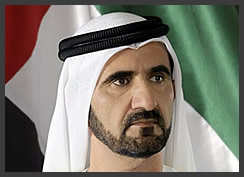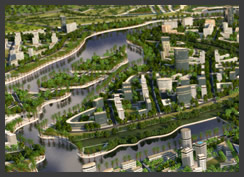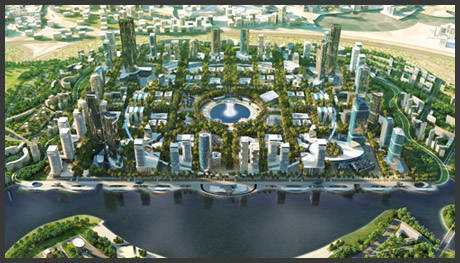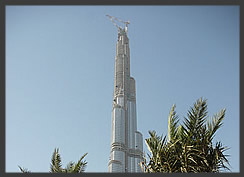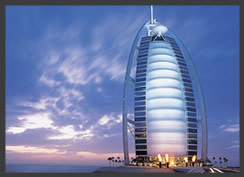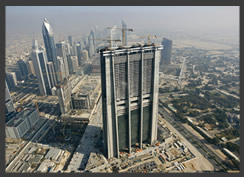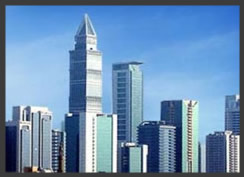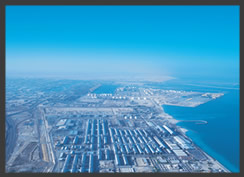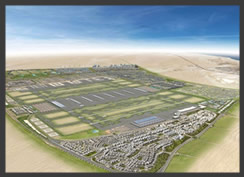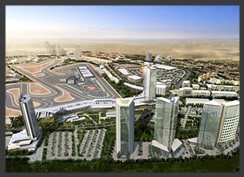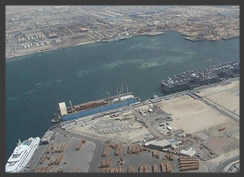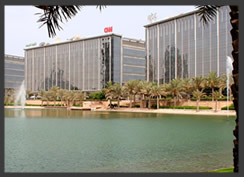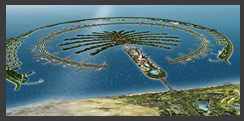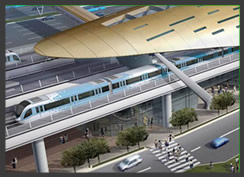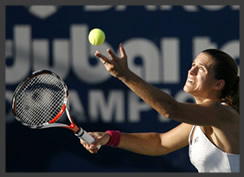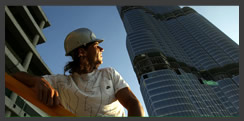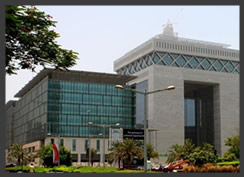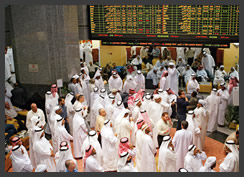Dubai when desert dreams come true Country report about Dubai
Oil now plays a very minor role; it represents only around 3 percent of Dubai’s GDP. Dubai’s economic success story is mainly based on its 20 free zones (of which 12 are still under construction). You want to set up your own laboratory in order to invent new drugs for the health sector? Then DuBiotech, a dedicated free zone for biotech companies, is the right zone for you. Entrepreneurs in the IT-sector establish their firms in Dubai Internet City and trade companies go either to the Dubai Airport Free Zone or Jebel Ali Free Zone. Nearly all Fortune 500-companies are present in Dubai.
|
There are ambitious cities in the world, and there are very ambitious cities. Then, there is Dubai. The emirate’s objectives are constantly being set higher and higher by its ruler, His Highness Sheikh Mohammed Bin Rashid Al Maktoum. “We do not want to become just number one in the Middle East, but we work tenaciously to become number one in the world,” he declared confidently. |
|
|
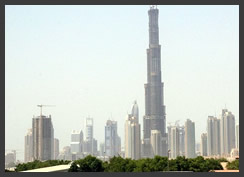 Burj Dubai (The World’s Tallest structure)
|
As a result, no other city in the world has achieved so much in such a short period of time since the start of the new millennium. In addition, maybe no other place is dubbed with more nicknames. “The Gateway to the Gulf“ is one of these. Other nicknames refer to Dubai as a shopping paradise with the two labels: “Fly – Buy – Dubai” or simply “Do-Buy”. It is also known as “Dubai Inc.”, crediting the ruling family’s efforts in transforming with an amazing speed the former fishing and pearl diving village at the romantic creek into a global financial centre. These efforts resemble more those of tycoons than of politicians, explaining why Sheikh Mohammed does not raise his eyebrows when people call him “the CEO of Dubai Inc.” Dubai’s real gross domestic product (GDP), which surged to a record Dh198 billion in 2007, is predicted to sustain an average growth rate of 11 percent for the next eight years. In his strategic plan Dubai Vision 2015, HH Sheikh Mohammed expresses clear objectives for the society of the UAE, for the economy and also for the environment. In the environment city EmPark, companies from the waste and solar energy branch are invited to do research and to realise ideas to improve the quality of air and water in Dubai. “Go green” is the new slogan, according to Mohammed Bin Brek, CEO of Dubai Properties: “Social responsibility and obligation toward earth and the support for making a better world for everyone. HH Sheikh Mohammed Bin Rashid Al Maktoum is looking for the well being future of the environment of the people who live in the UAE and the people of the earth.” As of now, only eight percent of the emirate’s surface is covered with palms or greenery. |
|
The government is keen to raise this share to a fifth by the year 2020. Dubai Properties has also signed a contract with Empower, which will provide district cooling to |
|
|
Dubai Culture Village located at the famous creek. Culture Village is intended to be a world-class destination that mixes old-world pleasures and entertainment with a modern, sophisticated ambiance. District cooling is a much more efficient alternative of cooling buildings thanthe installation of air conditioners in every single room. Further more, Injaz, a subsidiary of Dubai Properties, wants to improve links between living communities by building “green ways” and bicycle tracks, in a 880 million square foot project, worth approximately Dh200 billion, named Mohammed bin Rashid Gardens. The first of its kind, the new Dubai Properties project will preserve and protect the environment and help to increase the amount of greenery in the country, according to its CEO Mohammed Al-Dabal. In order to achieve this objective, Dubai Properties founded a separate subsidiary called Injaz. Injaz consists of about 75 people and they want to grow to a whopping 400 by 2009. |
|
|
|
|
|
The aforementioned examples give proof that Dubai is not just a developed city, it is also environmentally conscious. All 6,000 taxis will be equipped with hybrid engines. A new law, which aims to ban plastic bags in shops and supermarkets, is also under study. Mohammed Al-Dabal said: “Dubai under HH Sheikh Mohammed is here to lead the world toward green earth and is doing so by this project to that is dedicated to this. Dubai is a proactive nation and that leads and takes the initiative to place the stepping stone that will set a new valuable trend.” |
|
| Dubai Inc. under construction | |
|
|
With a total population of around 1.5 million people, Dubai lags behind other prominent business capitals and is far from being a megacity (10 million people and above). But in terms of attracting economic power and cosmopolitan spirit, Dubai has become a name to rival New York, London, Singapore or Hong Kong. It needs only a few examples to discover the awakening giant with the Midas touch at the shore of the Arabian Gulf. The white iconic seven-star hotel, Burj Al Arab, with a height of 333 meters, is taller than the Eiffel Tower and the tallest hotel in the world. It became a global symbol of this ideal holiday destination located in a friendly, safe and exotic place in the Arab world. The Burj Dubai, currently under construction, will stand as the world’s tallest tower ( over 800 metres tall). The UAE accounts for the largest number of real estate projects in the GCC, followed by Saudi Arabia. The value of the 565 completed projects in the UAE stands at US$ 66.2 billion. The value of uncompleted projects adds another US$22,21 billon. Around 33 projects worth US$26,24 billion had to be cancelled. Fears of a bubble have been unfounded (as of yet). Pessimist abroad say that the GCC will collapse as the East Asian Tiger states did in 1998/99. Prices stopped climbing in 2008 for the first time but Robert Lee, Managing Director for Investment Projects at Nakheel has a different understanding of a boom-bust scenario: “Now, a crash has been predicted forecasted and questioned and speculated over the last 7 or 8 years and has not happened, will it ever happen? Probably. The element of real opportunity is the timing, everything in investment is about timing.” Nakheel’s artificial Palm islands became an icon of Dubai as a paradise for tourists and demand for villas on the palms is still high. “If your prices have been growing over 200% over 2 years and they stabilize. Is that a crash? No, I would say it is actually stabilization”, Lee explains. In March 2006, Dubai Ports (DP) World became the 4th largest shipping transport company in the world when it purchased UK-based Peninsular and Oriental Steam Navigation Company for £3,9 billion (US$ 7 billion), beating a rival bid from Singapore’s PSA International of £3,5 billion. Few people know that Dubai is home of the seventh largest aluminium company in the world, Dubai Aluminium Company Limited (DUBAL). Khalid Essa Buhmaid, Vice President of Corporate Relations & Intl. Affairs of DUBAL, does not hide his pride when he recounts DUBAL’s achievements: “We do export to every corner of the world, from China to Mexico, 45 countries worldwide. DUBAL contributes some 2.2 billion to Dubai’s economy every year.” The Dubai International Financial Centre (DIFC), founded in 2004, already plays a key role in tomorrow’s financial markets, bridging the gap in the time zones between Europe and East Asia. |
|
All of the aforementioned entities share the common goal of employing more Emiratis. In the melting pot that is Dubai, every nationality is present. “We‘ve got at the last count 28 nationalities that work in our company. Everywhere from Afghanistan to Zimbabwe so we can go from A to Z“, says Andrew Chambers, General Manager at Asteco, the largest property service firm in the UAE. Despite the economic boom, the “locals” suffer from a relatively high unemployment rate, which is estimated at over 10 percent. “We’re very proud that, as a company in a field where some specialized resources are very scarce, we have reached 23% Emiratization and the target is quite tough: 50% in the coming three years”, says Osman Sultan, CEO of Du. Du is the first privately owned telecom company in the UAE created after the government opened the telecom sector for competition and broke the monopoly of du’s arch-rival, Etisalat. “We wanted to show that, because we interact with the public at large, we need to be part of the society as well as responsible citizens of the society”, Mr. Sultan adds. |
|
| Now or never-mentality | |
|
The newly formed Dubai Aerospace Enterprise (DAE) proves that, for this tiny emirate, neither sky nor outer space is the limit. DAE aims to serve the global aviation industry. For such plans, the current Dubai International Airport in the north-western district of Deira is not sufficient despite 34 million passengers travelling through in 2007 and a growth rate of 19 percent annually, meaning it’s hard on the heels of London’s Heathrow airport (68 million passengers). “Dubai International Airport grew by 19% last year, whereas most other airports were growing by 4% at most; 4% or 5% maximum”, says Paul Griffiths, CEO of Dubai Airports. |
|
|
|
A new airport, the Maktoum International Airport (MIA), named after the ruling family, is already “in the pipeline”. It will be operational from 2010. The target stands at 120 million passengers by 2030. “We’re actually going to be investing between $30 and $40 billion in the infrastructure at MIA”, Griffiths explains. The six-runway Maktoum International Airport is planned the biggest airport in the world. It will be located adjacent to Jebel Ali Freeport, which is the world’s largest man-made harbor and the biggest port in the Middle East. The Jebel Ali Free Zone is home to 5,500 people from 120 countries. With the expansion of the city, remote areas suddenly find themselves at the epicentre of Dubai, as Omar al Mesmar, General Manager of the Dubai Investment Park, outlines: “Four years ago, we were saying that Dubai Investments Park would be located in the south of Dubai, but now we can say that it will become the core of the city because there are major developments exactly next to us; the new airport – Al Maktoum airport – is within walking distance, actually, the Jebel Ali port, the Palm Jumeira and Jebel Ali, Sport City, Motor City, and Jumeira Village South, so it’s easy to access.” The man-made islands Palm, designed by real estate developer Nakheel, will also be easily accessible. |
|
The company acquired capital by listing the world’s most valuable Islamic bond, worth almost one billion dollars, at Dubai’s international exchange, DIFX. |
|
| Freezone Economy | |
|
|
|
|
Oil now plays a very minor role; it represents only around 3 percent of Dubai’s GDP. Dubai’s economic success story is mainly based on its 20 free zones (of which 12 are still under construction). You want to set up your own laboratory in order to invent new drugs for the health sector? Then DuBiotech, a dedicated free zone for biotech companies, is the right zone for you. Entrepreneurs in the IT-sector establish their firms in Dubai Internet City and trade companies go either to the Dubai Airport Free Zone or Jebel Ali Free Zone. Nearly all Fortune 500-companies are present in Dubai. |
|
| Dubai Tourism | |
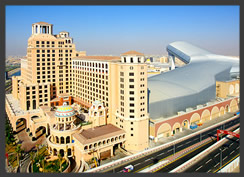 Emirates Mall |
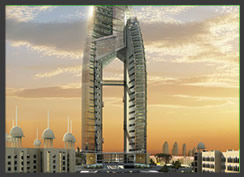 Trump International Hotel & Tower |
|
|
But where is the cultural aspect in all this? Arts and design, which have been neglected for quite a while, are gathering pace. The DIFC Art Week is attracting local and international painters and brings some life into the cold walls of the Financial Centre. Tourists who want to learn more about the UAE’s history as a fishing and pearl diving spot can do so in the lovely Heritage Village near the famous Dubai creek. Occupational rates in the hospitality sector constantly break world records – a paradise for hotel managers: “Rezidor hotel group never experienced a hotel like us which opened and in the first month of occupancy we reached a 93 percent, second month was 94 percent and 95 percent”, says Siegfried Nierhaus, General Manager of the Radisson SAS in the Dubai Technology Free Zone “Tecom”, which consists of Knowledge Village, Internet City and Media City. Such rates became normal in the Gateway to the Gulf, where travellers staying at the luxurious hotel Kempinski Mall of the Emirates even enjoy skiing. |
|
So it’s no wonder that tycoons, like New York’s Donald Trump, became eager to gain foothold in Dubai. The famous/infamous real estate mogul from the Big Apple is currently setting up Trump International Hotel & Tower on Nakheel’s Palm Jumeirah, just opposite the newly opened Atlantis Hotel, which will welcome its first guests in 2009. The coming year will be a watershed in the emirate’s history, when the Dubai Metro will start to transport passengers from Dubai International Airport over the creek and along Dubai’s famous Sheikh Zayed Road to port city Jebel Ali. A metro connection to the Palm Jumeirah to the two hotels has been recently completed. |
|
|
|
|
| We are all celebrities! | |
|
Even the annual Dubai International Film Festival (DIFF) is already an established date in the agenda of world’s glamour business. It gives a platform for filmmakers from the Arabian world and from Iran and India likewise to show their work. The DIFF has also hosted Hollywood stars, such as Sharon Stone, Morgan Freeman and George Clooney. Regarding sports, Dubai’s arenas are a centre for the football winter training camps of Europe’s top clubs, such as FC Bayern Munich, Olympique Marseille or Juventus Turin. From 2004 to 2007, the German record champion Bayern Munich spent four consecutive winter training sessions in Dubai. |
|
|
|
Oliver Kahn & Co. always chose the iconic Jumeirah Emirates Towers as their residence. Dubai’s twin towers meanwhile have the highest concentration of VIP guests in the Middle East. Football is the most popular sports among young Emirati boys and girls. “Never give up” is the slogan of the UAE national team, which has taken a tough stand in the past against giants such as Germany, England or Brazil. “We qualified the World Cup in Italy in 1990, which was a big achievement”, recalls Mohammad Khalfan Al Rumaithi, President of the UAE Football Association. “ In 1996 we became second during the Asian Cup. We achieved twice the 2nd position in the Arabian Gulf Competition and we won last year for the first time in the history of our country as far as the main national team is concerned.”
|
|
Together with Formula 1 in 2009 Abu Dhabi is becoming a world business and sport venue in the world. I am happy to see my country hosting big events of this kind.” But what about the 2010 World Cup in South Africa? Al Rumaithi smiles: “Certainly, we would like play in the 2010 World Cup.” |
|
|
Other disciplines deliver success stories as well. Thousands of tennis aficionados enjoy cheering top stars like Roger Federer or Rafael Nadal at the annual Barclays Dubai Tennis Championships in January. Just ask the taxi driver in Dubai for the Dubai Aviation Club and he will bring you straight to the Dubai Tennis Stadium. “It’s one of the best tennis stadiums in existence today”, says Gerard Kearney, General Manager of the Dubai Aviation Club. He adds “It is ideal for the purpose for which it was built. It seats 5000 people and we do the Dubai Tennis Championships annually, which includes the WTA, which is the women’s and men’s, followed by the ATP, the men’s event. Both of them, back to back, usually take place from the last week of February to the first week of March.“ The UAE and Dubai in particular was honoured by athlete Sheikh Ahmad Mohammed Hasher Al-Maktoum when he won the first Olympic gold ever for the Gulf state in Athens 2004 with victory in the men’s double trap shooting event. Another golf course named after world class champion Tiger Woods will add to Dubai’s impressive portfolio of golf courses. Last but not least, with the ultramodern Dubai Sports City, the emirate already dreams of hosting the Olympic Summer Games sometime in the future. “If Allah gave you health and fortune you should enjoy it”, says Dr. Omar Bin Sulayman, Governor of the DIFC, to explain his passion for collecting extravagant cars. His words could also be a slogan for the coming years: “If God gave you health and fortune you should enjoy it.” Swiss private banker, Edgar de Piciotto, founder and chairman of Union Bancaire Privée, which runs a subsidiary in the DIFC, also has a fitting quote regarding the future of Dubai: “As I said before to all young people of this world, my motto is no longer the 19th Century’s direction of “Go West” but rather “Go East””. |
|
| Dubai, city of contrasts | |
|
There are few cities in the world where the American Citigroup (which is, by domestic US law, not allowed to do any business with the Shi’ite State) and Tehrani banks – Bank Sedarat and Bank Melli – are operating side by side. In the DIFC, French banks have their offices just above leading American law firms and financial institutions from the Bahamas and Iceland. As if completely untouched by the global subprime-crisis, banks, and especially Islamic banks, in the UAE continue to report double or even triple-digitprofit growth figures. Western banks with a strong exposure to the Middle East benefit likewise, including British banks HSBC and Standard Chartered Bank. In 2007, the assets of all 52 banks surpassed one trillion dirhams (around 368 billion dollars) for the very first time. In terms of international standards, banks had to adapt the strict transparency and capital guidelines of Basel II. “I think this is a very positive development”, says H.E. Sheikh Omar bin Saqr Al Qasimi, Chairman of Ras al Khaima (RAK) Bank. “At RAK Bank, we set these standards a long time ago, before the central bank. I think it is very positive to have a safe and secure banking system.” However, another financial challenge is just round the corner: the GCC member states (UAE, Saudi Arabia, Kuwait, Qatar, Bahrain and Oman) plan a single currency for the year 2010. “High inflation rates are the major hurdles on the way to a currency union”, says Dr. Nasser Sa?di from the DIFC. |
|
| High standards for a world class economy | |
|
|
Along with the Dubai International Financial Centre (DIFC), Dubai also set up an onshore hub with international standards and best practices. Since it opened in September 2004, the 110-acre free zone in the heart of Dubai has attracted high calibre firms from around the globe as well as the region. A world-class stock exchange, the Dubai International Financial Exchange (DIFX), opened in the DIFC in September 2005. The Dubai Business Bay, currently built adjacent to the DIFC, is the place where the world’s tallest tower “Burj Dubai” (Tower of Dubai) will be located. “This is the place where my dream will be realized”, said Sheikh Mohammed when construction started two years ago. The Dubai Financial Market will also move from the good old World Trade Centre to Business Bay in an iconic building designed by British Iraqi star architect Zaha Hadid. She is also the mastermind behind Dubai’s skewed Signature or Dancing Towers (under construction). For those who have to work hard in order to realise Mrs. Hadid’s ideas, times are improving. The government launched a zero-tolerance policy in 2008, forcing developers to pay the mostly Asian contractors on time and providing them with humane accommodation. In addition to that, real estate brokers must be licensed by the newly established Real Estate Regulatory Authority (RERA). |
